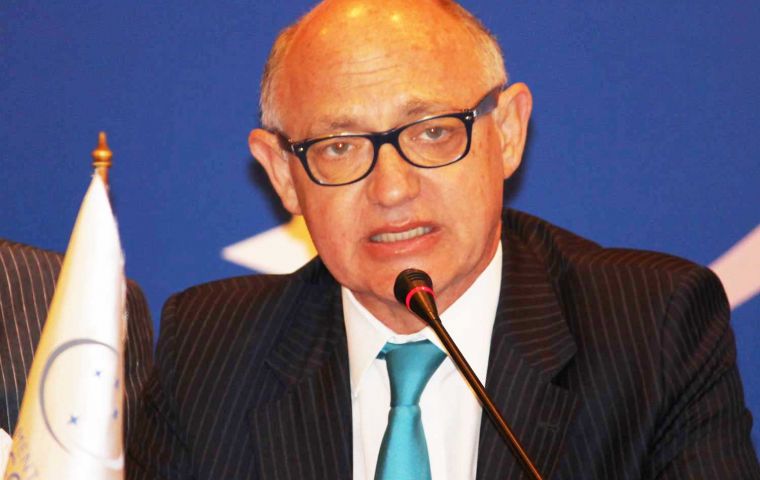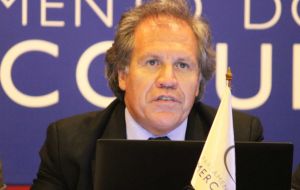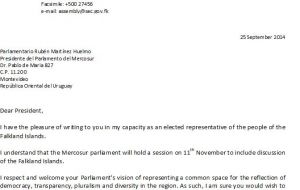MercoPress. South Atlantic News Agency
Falklands' British 'colonial occupation' condemned by Parlasur
 “Let me tell you how grateful we are to this special session on an issue so important for my country”, said Timerman addressing Parlasur lawmakers.
“Let me tell you how grateful we are to this special session on an issue so important for my country”, said Timerman addressing Parlasur lawmakers.  Uruguay's Almagro pointed out to the 'many documents and resolutions' which indicate that self determination is only applicable to subjugated peoples
Uruguay's Almagro pointed out to the 'many documents and resolutions' which indicate that self determination is only applicable to subjugated peoples  MLA Short addressed a letter to Martinez Huelmo requesting the Islanders be given a chance to put forward their position
MLA Short addressed a letter to Martinez Huelmo requesting the Islanders be given a chance to put forward their position The Mercosur parliament, Parlasur, in a special Monday session held in Montevideo, rejected British 'control' over the Falklands/Malvinas Islands and described the situation as a colonial conflict of 'global' proportion which threatens the region.
UK's negative to negotiate the Islands sovereignty was defined as an “anachronistic” colonial position, unjustified under any consideration, aggravated by the 'militarization' of the Islands and the 'illegitimate' exploitation of fisheries and hydrocarbons resources according to the declaration approved unanimously.
The special session on the Falklands/Malvinas question not only convened lawmakers from Argentina, Brazil, Paraguay, Uruguay and Venezuela, (Mercosur full members), but also Argentine foreign minister Hector Timerman and Uruguay's Luis Almagro.
“Let me tell you how grateful we are to this special session on an issue so important for my country, in which all of you have stated your support, clearly showing that this is a regional issue”, said Timerman addressing the Parlasur lawmakers.
Timerman then went on to describe how Britain had occupied the Islands in 1883, in an act of usurpation.
“The United Kingdom invaded Argentine land with the sole motive of possessing a territory with strategic advantage, to control inter-oceanic passes... and now they have there the biggest military base in the world south of the 50th parallel, they sell hydrocarbons and empty the seas awarding fishing licenses. The clothes are different, but it is the same plan,” the minister underlined during his speech.
Most of the speakers during the special session rejected the right to self determination as argued by the British government and the inhabitants of the Falklands/Malvinas to justify their position and 'occupation' of the Islands.
In effect at the end of September and aware of the coming special Parlasur session to address the issue, the elected Legislative Assembly from the Falklands sent a letter to the chair of the meeting, Uruguayan lawmaker Ruben Martinez Huelmo requesting they be given the opportunity to express their opinion, as peers of the Mercosur legislative.
In the letter elected member of the Legislative Assembly Gavin Short said that he was writing to the President of the Mercosur parliament and “as a fellow parliamentarian respectfully to suggest that in order for Parlasur to uphold its high ideals, it should give an opportunity to a representative of the elected Government of the Falkland Islands to speak at the session on 10th November. By doing so, you will demonstrate that you are impartial as an institution and support human rights and self-determination, fundamental values enshrined in the United Nations Charter and the cornerstone of every democratic Parliament and Assembly”.
MLA Short insisted that “I'm sure you would wish to encourage a balanced discussion at the special session....and for this to happen successfully, you will need to hear the voice of the people of the Falkland Islands and to listen to our story”.
Apparently the letter was read before Parlasur during the Sunday preparatory discussions of Monday's special session, and was booed and strongly rejected by the Argentine representatives who later received the support of their Mercosur peers.
A year ago the Falkland Islands held a referendum in which they overwhelmingly expressed their wish to continue as a British Overseas Territory, a decision which was considered illegitimate by Argentina.
To that respect Uruguay's minister Almagro pointed out to the 'many documents and resolutions' which indicate that self determination is only applicable to subjugated peoples, and “in Malvinas there are only people originated with the colony or in other words a transplanted population”.
Timerman insisted on the point saying that of 3,000 population in the Islands only 35% have been born there and the rest are “colony settlers from the metropolis”, authorized to live there by the governor who is “a member of the Foreign Office”.
“It's a population artificially settled to ensure the occupation and to conspire against Argentine interests” added the Argentine official.
Timerman also thanked the Parlasur for its unanimous support to Argentina's arguments which describes the occupation of the Islands as a “military and economic colonialism” attack on Argentina, which insists in “imposing in our region as system so that our peoples can never fully develop”.
Among the most vocal of lawmakers was Venezuela's Blanca Eckhout who said that “decolonization of the Malvinas is a task that can't be put off”, and the British presence in the Islands is “an open bleeding wound for Mercosur”.
“It is an usurped piece of Argentine used as a military base, it's a constant call to continue fighting for our complete independence, with no impositions, custodians or threats”, said the vociferous Ms Eckhout.
Argentina in 1982 invaded the Falklands and occupied them by force until pushed out by a British task force 74 days later. The conflict cost almost a thousand lives. Argentina has since repeatedly pledged to appeal to diplomacy and peace to recover the Islands and has displayed an aggressive diplomacy in all possible forums disregarding the Islanders as simple 'squatters' according to the expression used by President Cristina Fernandez.
However in the nineties under President Carlos Menem and Foreign minister Guido Di Tella relations improved and several agreements were reached regarding fisheries, oil, communications and conservation (leaving aside the sovereignty dispute 'under an umbrella'). But the Kirchner couple, first Nestor and now Cristina dumped overboard all the understandings reached with Menem.




Top Comments
Disclaimer & comment rules-

-

-

Read all commentsIn breaking news: a bear shat in the woods!
Nov 11th, 2014 - 04:13 am 0My God in heaven.....it's like playschool...booing a letter they don't like and lying to each other to show off how stupid they are.
Nov 11th, 2014 - 06:34 am 0usurption: How many Argentines were “evicted”, what was the loudest any of the “evicted” had been on the islands?
Inheritance: How many of the Spaniards on the islands between 1767 and 1811 became Argentine?
Geography: Why aren't all island groups 300 miles of the coast part of the country nearest to them?
Colonialism: why is Patagonia part of Argentina, but it wasn't in 1833?
Hypocrisy....what these guys are full off....
Shit...what Hector Timmerman speaks
Just laughed my bollocks off, where oh where do these numbnuts think they are? 1833?
Nov 11th, 2014 - 08:02 am 0Just grow a pair Argentina your economy is about to explode, do something positive with your own country.
Commenting for this story is now closed.
If you have a Facebook account, become a fan and comment on our Facebook Page!